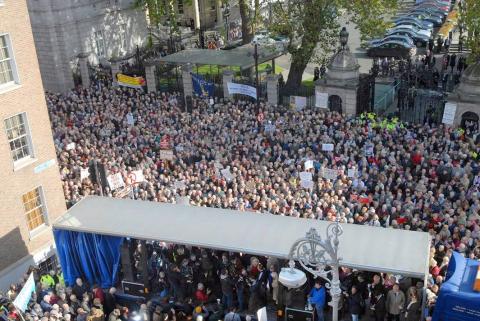Prospects for the Elderly in a Brave New World

A recent headline from the Irish Times ("Elderly Take Over", Jan. 13) conjures images of the medical card protests in October 2008 by the elderly citizens of Ireland. Clearly, the effect of an ageing population on economics, politics, and society in general is in need of contemplation. The UN Population Division has issued a report showing how trends in the average age of workers will affect advanced societies.
The UN report finds that the proportion of older (>65) people in the world is growing at three times the rate of the rest of the population, meaning that, by 2050 in Ireland, 1 in 4 people will be over 65, and 1 in 10 will be over 80. That simple fact will change the way Ireland operates.
I’m very concerned with the ageing issue in my book. I’m 31 years old. If I look after myself and don’t get hit by a bus, I have a good chance of seeing 2050, when I’ll be in my seventies. What might life be like for those my age?
Many of the biggest changes in the next century, at least in the developed world, will be driven by the demographic tilt away from children and towards the elderly. A snapshot of a family gathering in 2050 will show lots of gray hair, and not too many nappies. Even now, for the first time in history, the average German, the average American and the average Japanese has more parents living than children. The family will take centre stage again in the provision of eldercare, especially among the poor, with state and private supports in the community.
In 2050, relative to today, everyday life will be brilliant for older people. 55 will be the best age to be in 2050, not 25. Advances in health care will allow us to live better, and for longer. The definition of ‘old’ itself will change, with most people retiring only in their seventies, and many of those retirees will be in rude health, able to enjoy the benefits a lifetime of work and saving will give them.
Increases in the average level of wealth will mean that, by 2050, we will be at least 3 times as wealthy as a society as we are now, able to afford more, and do more with our wealth. Prosperity, for us, is just around the corner—as long as we can pay those mortgages down quickly, and save intelligently for 40 or more years.
As older workers become wealthier, and make up a correspondingly larger share of Ireland’s population, their financial and political clout will encourage societal changes. Research and development will focus on health-care technologies to extend life and enhance quality of life, because pharmaceutical companies will seek to profit from our ageing demographics. Television, fashion and culture will mould around our preferences, thanks to ratings, sales metrics, and our sheer numbers in Irish life.
Elderly issues will dominate politics, and all parties will seek our favour in order to secure election. Our increased wealth will allow us to lobby for increased rights and benefits for the elderly—and we will get these rights and benefits, through a pliant judiciary, and a political apparatus desperate to please us.
The elderly will take over. Huzzah!
